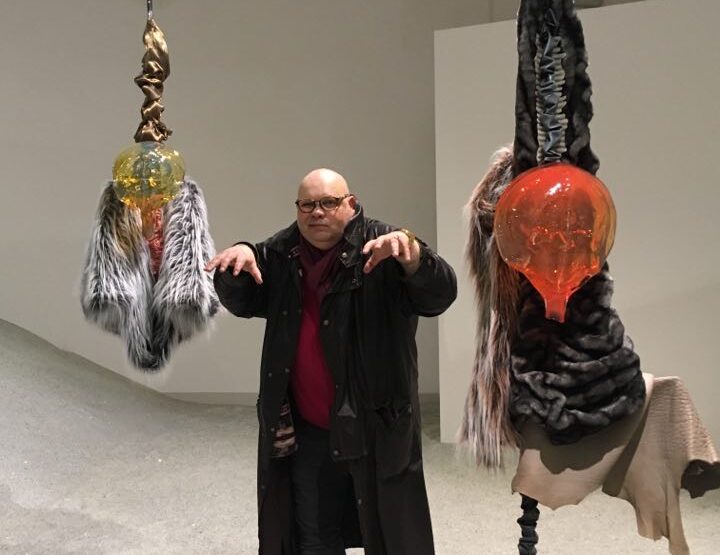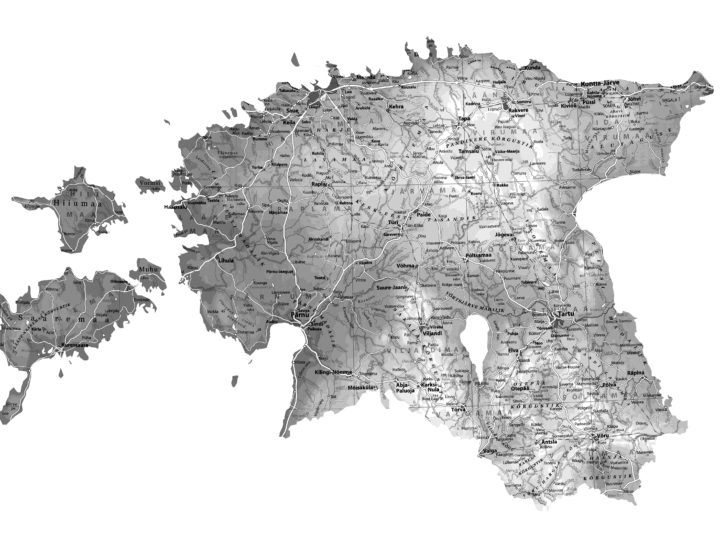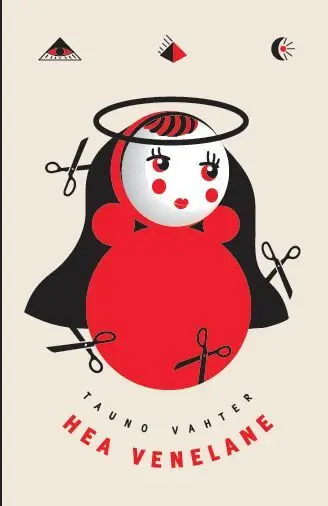This year marks the thirtieth birthday of Tõnu Õnnepalu’s, aka Emil Tode’s Border State (1993), one of the most widely translated contemporary Estonian novels, it has been published in close to 20 languages.
It is lauded as an iconic representation of the emotions accompanying the post-Soviet transition: the desire to blend into Old Europe, while experiencing imposter syndrome, and the desire to leave Estonia behind, while missing its landscapes. Estonians today are no longer angrily mesmerized by department store windows, like the narrator, but their sense of a specifically Eastern European identity has been harder to erase. When Border State came out, there were practically no literary representations of same-sex desire written in Estonian. While the acceptance of sexual and gender minorities has increased in the past thirty years, recent marriage equality debates have also revealed lasting prejudices. Thus, it is a good time to revisit Border State.
With its forward and backward gaze, the novel is of its time and ahead of its time. It is worth stressing that Border State brought the techniques of what has come to be called autofiction into Estonian literature before it became an international fashion in the 2010s (think of the success of Karl Ove Knausgård’s autofiction work, for example). By 2021, autofiction had outlived its freshness in English, but it was only emerging in the 1990s, practiced by writers tied to the French intellectual life. Õnnepalu caught this trend before it became a major international fashion.
Autofiction, as defined by the French novelist Serge Doubrovsky in 1977, is based on autobiographical material that is given fictional form to escape the constraints of a true life story. The author uses his or her life or even name, but subjects this material to experimental fictional techniques. This genre has a long tradition in France for exploring gender and sexuality. It was used in the 1990s by Hervé Guibert to convey the AIDS experience with candor and considerable indiscretion. Although his most famous book, To the Friend Who Did Not Save My Life (1990), was published in English in 1993, it did not find a receptive audience. Today, however, Guibert is considered the forefather of popular autofiction writers who analyze their sexuality, such as Édouard Louis.
Border State seems to have already picked up this generative influence in 1993. The novel is written as an extended letter to an American called Angelo. The narrator has no name and, thanks to the lack of grammatical gender in Estonian, no gender (the English translation makes the narrator male, though). The narrative evolves in a series of fragments that shift between the narrator’s memories of growing up in an unnamed Eastern European country in the north, easily identified as Estonia, and his life in Paris. The narrator has received a scholarship to translate post-WWII French poetry, but the stress is on his relationship with a French academic, Franz, who has died. Whether the narrator killed him is unclear, but we see a love-hate relationship both with Franz and France. The narrator meditates extensively on the East-West relationship and on performing an identity more broadly.
The first sentence of the novel identities the narrator as a “bystander observing the world” (Õnnepalu, 2000: 1). At times, this bystander has an eager face pressed up against the shop window of Western Europe, to borrow an image from the novel but, at other times, the narrator is also an astute critic of Western hypocrisies. This format allows Õnnepalu to play with confession in the Foucauldian vein, as has been noted by Skerrett (2006) and Laanes (2009). Laanes (2009: 233-243) in particular, has shown the tension between the desire to give an account of oneself and the resistance to the confessional mode that fixes one in rigid truth regimes. While promising us revelations about one’s true identity—sexual or ethnic—the first-person narrative instead challenges the confessional norm of coming out as a gay man or as an Eastern European trying to pass in Paris. The confession does not reveal but obfuscates. This unwillingness to reveal should not be read as a sign of shame, but a creative strategy in tune with the queer theory that also emerged in the 1990s. There is no one truth to confess, no fixed self to reveal. The identity of the narrator, following the ideas of Judith Butler, is performative, citational, and fluid.
Such opacity, as Nicholas de Villiers (2012) proposes, allows subjects to resist compulsory transparency, in recognition of the often contradictory human desires. A person need not be one thing all the time. Sexuality might not be the most telling element of a person’s life or work. This opacity leaves space for creativity, as Õnnepalu hints at in the novel: “There is something on one side and something on the other side of the border but there is no border. /… / And if you should happen to stand on the border, then you too are invisible, from either side” (Õnnepalu, 2000: 97).
In Border State, identity labels are shown to be simplifying classification tools that fail to explain individual or socio-historic complexity. Instead, they recreate convenient hierarchies between the norm and deviance (being poor, immigrant or gay). The Eastern European narrator is a metaphorical drag artist who, by mimicking the cultured Westerners, shows the artificiality of the East-West distinction, and its rootedness in power imbalances. This imbalance puts the narrator’s country of origin in the past century for the Westerners, who want to believe that they inhabit a sleek future, and refuse to acknowledge the shared present. As the narrator acerbically notes, “When they hear you’re from Eastern Europe they look on you with pity and speak with hollow words, as if you were a dead relative” (Õnnepalu, 2000: 45). It is comforting to place the East in another time, forever chasing Western modernity with no hope of catching up, the barbarian waiting for the mission civilisatrice. Yet, the Eastern gaze is also necessary for the West to create its own identity. As the narrator notes:
As a true East European I sat bright-eyed and listened to his outrageous ideas about freedom, about Foucault and Derrida. Why not? Especially for the promise of a delicious supper in the luxurious ambience of ancient Europe. I listened as a courtesan listens to her client, as a prostitute! All Eastern Europe has become a prostitute. From governments and university professors on, to the last paperboy, they are all ready to listen to wonderful speeches about democracy, equality, whatever you please, whatever the customer wishes! As long as he pays. (Õnnepalu, 2000: 20-21)
The narrator sees through this sense of superiority and wants “to expose the chaos that lay beneath those surfaces, always on the brink of exposure” (Õnnepalu, 2000: 8-9). Westerners are self-satisfied and have come to accept their optimistic stories, ignoring double standards and fruit with no taste. They speak empty words about how interesting it must be to witness something real happening in Eastern Europe, while ignoring the human cost of this restructuring (Õnnepalu, 2000: 75). Crisis is something that the West thinks it has left behind, while ignoring the AIDS epidemic unfolding in its own cities.
The West expects the legibility of gender and sexual identity, but the narrator does not give us a neat coming-out story. In a dream, the narrator sees himself as a Barbie doll who, upon being forced to strip by the police, relishes in revealing a sexless and opaque plastic body to the disciplinary gaze. He presents us with imaginaries of outré campy outfits, indirect hints at promiscuity, cruising, and even AIDS. These signifiers of gay sensibility and sexuality, however, appear in an ironic manner, suggesting that this, too, is a citational performance for the narrator’s desires to remain ambivalent: “I live a life that doesn’t interest me, say things I don’t believe, spend money that isn’t mine” (Õnnepalu, 2000: 56). There is no simple contrast between homophobic East and tolerant West. Norms, be they hetero- or homonormative, burden the narrator in both contexts.
The most vivid image, returned to multiple times, concerns grass, “ready for submissive death” yet triumphant over human life (Õnnepalu, 2000: 11). Towards the end of the novel, the narrator muses that his failure was the attempt to leave his place, “in the world of plants, in Eastern Europe” and pass for something else: “I wanted to see what it would be like to be human, to live like a human being. That was my terrible crime that I won’t be forgiven. I went along with the game, but passively, without believing in it.” (Õnnepalu, 2000: 70) The crime, thus, is not sexual nonconformity, but wanting to be a European and an individual, without placing oneself into the simplifying binary regimes of truth.
Õnnepalu’s novel allows us to relive and re-feel the transition period, along with its unease about belonging and exclusion; at the same time, it remains scathingly relevant. Border State recalls Lauren Berlant’s observation that autobiography is personal and general. Even today, Õnnepalu touches a social nerve and allows us to feel backward into the past and, perhaps, to better imagine our shared present.
Raili Marling (b. 1973) is a Professor of English Studies at the University of Tartu, Estonia. She has written extensively on representations of gender in contemporary culture and fiction.
References
De Villiers, Nicholas. 2012. Opacity and the Closet. Queer Tactics in Foucault, Barthes, and Warhol. Minneapolis: University of Minnesota Press.
Laanes, Eneken. 2009. Lepitamatud dialoogid. Tallinn: Underi ja Tuglase Kirjanduskeskus.
Õnnepalu, Tõnu. 2000. Border State. Trans. Madli Puhvel. Evanston: Northwestern University Press.
Skerrett, Delaney Michael. 2006. Narratiiv, ülestunnistus, identiteet. Emil Tode Piiririik. Keel ja Kirjandus 9, 728-735.
PHOTO Giuseppe Mondi/Unsplash
Bystander observing the world in Paris.





